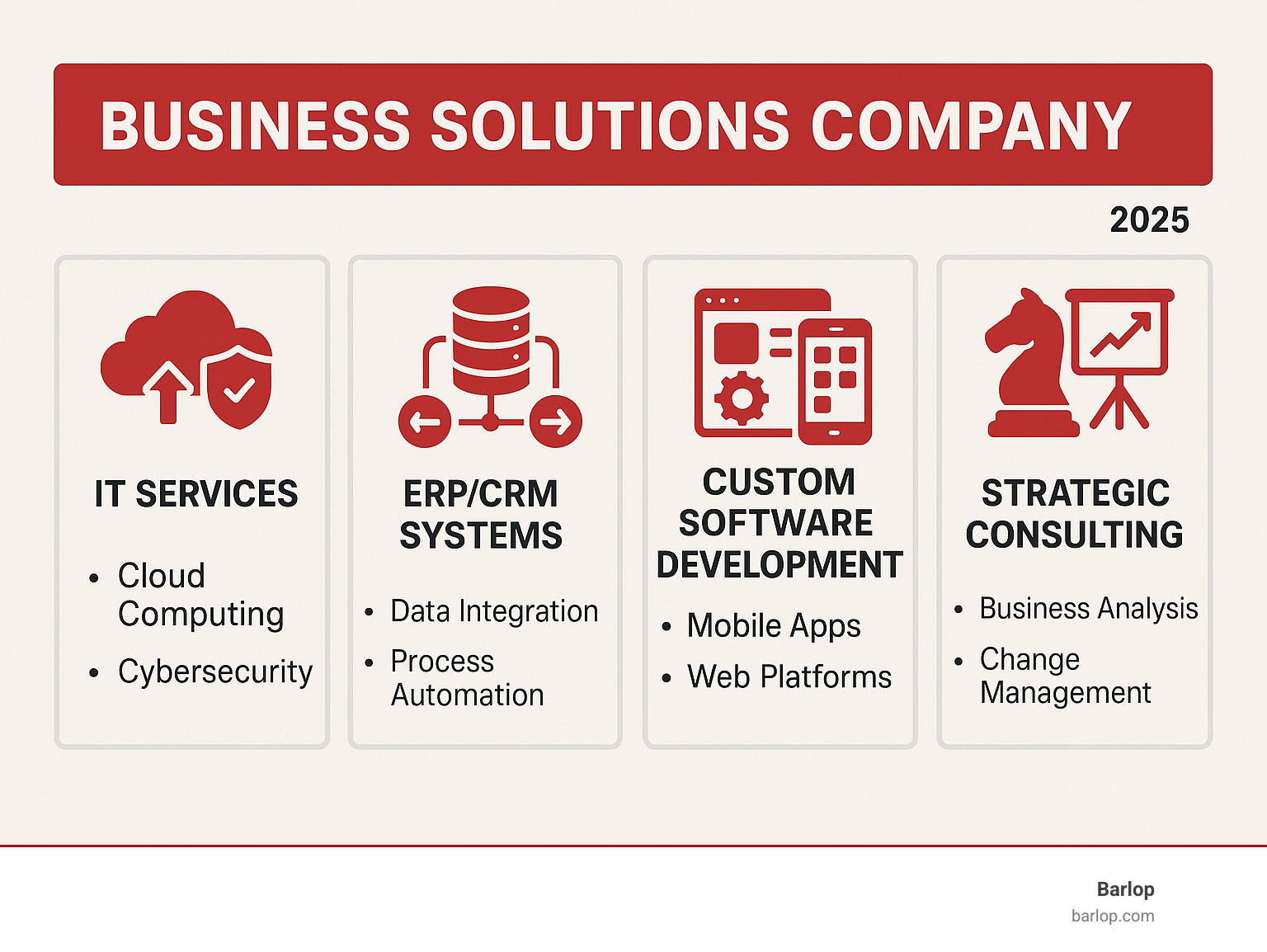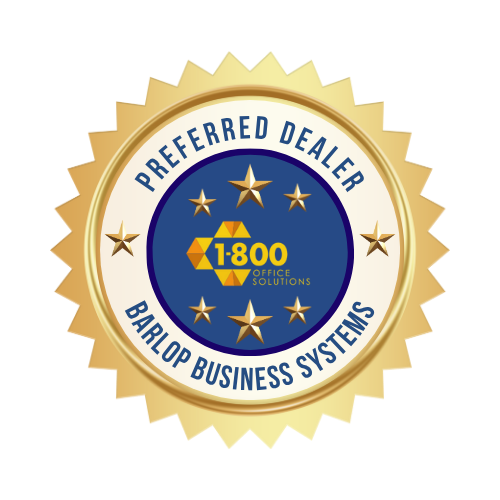Finding the right business solutions company can transform your operations, but with so many providers claiming expertise, how do you choose? The answer lies in understanding what services they offer, how they differentiate themselves, and whether they align with your specific business needs.
Quick Answer for Business Solutions Company Selection:
- Core Services: ERP/CRM implementation, custom software development, cloud services, IT consulting, data analytics
- Key Differentiators: Industry expertise, proven track record, client-centric approach, innovation focus
- Evaluation Criteria: Case studies, implementation process, long-term support model, partnership philosophy
- Getting Started: Initial consultation → needs assessment → proposal review → implementation
Today’s businesses face mounting pressure from rising costs, operational inefficiencies, and rapidly evolving technology demands. Research shows that executives are maturing AI adoption, accelerating cloud use, and prioritizing enterprise partnerships to achieve outcomes amid these cost pressures.
The stakes are higher than ever. Companies using modern ERP solutions like SAP S/4HANA can achieve up to 15% reduction in IT costs, while businesses implementing comprehensive business solutions see up to 25% improvement in operational efficiency. These aren’t just numbers – they represent real competitive advantages in today’s market.
But success depends on choosing the right partner. As one IT leader put it: “JourneyTeam is adept at Microsoft technologies and has some of the best and brightest people” – highlighting how the right expertise and people make all the difference.
The challenge isn’t just finding a provider – it’s finding one that understands your industry, takes ownership of outcomes, and views your success as their success. Whether you need ERP implementation, custom software development, or comprehensive IT consulting, the right business solutions company becomes a strategic partner in your growth journey.

Handy business solutions company terms:
Decoding Modern Business Challenges
Running a business today feels a bit like trying to solve a jigsaw puzzle while someone keeps adding new pieces. Whether you’re managing a growing startup or steering an established company, the challenges seem to multiply faster than solutions can be found.
Let’s be honest – operational inefficiency is probably keeping you up at night. You know the feeling: processes that should take minutes stretch into hours, data gets trapped in silos, and your team spends more time wrestling with systems than actually getting work done. We’ve worked with clients who were drowning in fragmented systems where information couldn’t flow from one department to another. The good news? Modern ERP solutions like Acumatica can improve operational efficiency by up to 25%, turning those frustrating bottlenecks into smooth highways.
Then there are the rising cost pressures that seem to squeeze from every direction. Energy bills climb, supply chain costs fluctuate wildly, and maintaining IT infrastructure feels like feeding a hungry monster that’s never satisfied. Every business owner we meet is looking for that sweet spot – cutting costs without cutting corners. SAP S/4HANA users often see up to 15% reduction in IT costs, which can make a real difference when every dollar counts.
Supply chain visibility is another puzzle piece that never seems to fit quite right. Do you really know where your products are right now? Not just the general idea, but the exact location, condition, and expected arrival time? Many businesses operate with blind spots that lead to stockouts, delays, and those dreaded customer service calls. When implemented properly, solutions like SAP can improve supply chain visibility by up to 20%.
We’re drowning in data but somehow still thirsty for insights. Your systems are probably generating reports faster than you can read them, yet making strategic decisions still feels like educated guesswork. The challenge isn’t collecting information – it’s turning that mountain of data into actionable intelligence that actually helps your business grow.
Cybersecurity threats add another layer of complexity. Every business, regardless of size, has become a potential target. One successful attack can devastate both finances and reputation. The good news is that robust cybersecurity doesn’t have to break the bank – solutions designed for small businesses can start from just $10 per month.
The pace of digital change never slows down. Just when you’ve mastered one system, three new technologies emerge that promise to revolutionize everything. It’s not just about buying new software – it’s about creating a culture where your team can adapt and thrive amid constant change.
Your customers aren’t making things easier either. Customer experience expectations have skyrocketed. They want personalized service, instant responses, and seamless interactions across every touchpoint. Meeting these demands requires sophisticated CRM systems and integrated platforms that can keep up with their needs.
Finally, there are the employee skill gaps that seem to widen as fast as you can fill them. Technology evolves, job requirements shift, and suddenly your star employees need training on tools that didn’t exist last year. Investing in continuous learning becomes crucial – platforms like LinkedIn Learning offer over 24,000 courses across 25 languages to help bridge these gaps.
These challenges don’t exist in isolation. They’re interconnected, each one affecting the others in ways that can amplify problems or, when addressed strategically, create opportunities for breakthrough improvements. That’s where partnering with the right business solutions company becomes not just helpful, but essential for sustainable growth.
What is a Business Solutions Company and What Do They Offer?
Think of a business solutions company as your strategic partner in solving the problems that keep you up at night. We’re not just another IT vendor selling software – we’re the team that rolls up our sleeves, understands your unique challenges, and crafts solutions that actually move the needle for your business.
At its core, technology is the great problem-solver of our time. It’s what transforms a chaotic supply chain into a well-oiled machine, turns overwhelming data into crystal-clear insights, and helps small teams accomplish what once required entire departments.
Core Services Provided by a Business Solutions Company
When you partner with a comprehensive business solutions company, you’re gaining access to a toolkit designed to tackle your toughest operational challenges.
IT consulting forms the foundation of everything we do. We start by diving deep into your current technology landscape, identifying bottlenecks, and mapping out a strategic roadmap for improvement. This isn’t about pushing the latest shiny software – it’s about understanding what will actually make your team’s life easier.
ERP implementation is where we see some of the most dramatic changes. Enterprise Resource Planning systems like SAP and Acumatica bring all your scattered business processes under one roof. Instead of juggling separate systems for finance, inventory, and HR, everything talks to each other seamlessly. The result? Teams spend less time hunting for information and more time acting on it.
CRM systems revolutionize how you connect with customers. These platforms don’t just store contact information – they track every interaction, predict customer needs, and help your sales team close deals faster. When your customer service rep can see a complete history of every touchpoint, magic happens.
Cloud services offer the flexibility that modern businesses demand. Whether you’re migrating existing systems or building something entirely new in the cloud, these solutions scale with your growth while often reducing costs. No more worrying about server crashes at 2 AM or whether you have enough storage space.
Custom software development comes into play when off-the-shelf solutions just don’t fit your unique business model. We design and build applications that work exactly how your team thinks and operates. It’s like having a perfectly custom suit versus something off the rack – the difference is immediately noticeable.
| Solution Category | Core Purpose | Key Features |
|---|---|---|
| ERP Systems | Unify core business processes (finance, HR, supply chain) | Centralized data, process automation, financial management, inventory control |
| CRM Systems | Manage customer interactions and relationships | Sales automation, marketing automation, customer service, contact management |
| Custom Software | Address unique business requirements not met by off-the-shelf solutions | Custom functionality, specific workflows, competitive advantage through unique tools |
Managed IT services take the technology headaches off your plate entirely. Instead of scrambling to fix problems when they arise, we monitor your systems around the clock, preventing issues before they impact your business. Your team can focus on what they do best while we handle the technical heavy lifting.
Data analytics and business intelligence turn your company’s information into your competitive advantage. We help you spot trends, understand customer behavior, and make decisions based on facts rather than gut feelings. System integration ensures all your various tools and platforms work together harmoniously, while security services protect everything you’ve built from evolving cyber threats.
How Technology Solves Key Problems
The real magic happens when technology starts solving your actual business problems, not creating new ones.
Process automation eliminates the tedious, repetitive tasks that drain your team’s energy. Imagine invoices that process themselves, inventory that reorders automatically when stock runs low, or reports that generate and distribute without human intervention. This isn’t science fiction – it’s Tuesday morning at companies using smart automation.
Real-time data access means decision-makers no longer work with yesterday’s information. When your sales manager can see current inventory levels while talking to a customer, or your CFO can access up-to-the-minute financial data during budget meetings, better decisions happen naturally.
Cost reduction occurs through smarter resource allocation and streamlined operations. Cloud solutions eliminate expensive hardware purchases, while automated processes reduce the need for manual labor. These aren’t just line items on a budget – they represent real money that can be reinvested in growth.
Improved efficiency shows up in countless small ways that add up to major improvements. Faster transaction processing, optimized supply chains, and eliminated duplicate data entry all contribute to a business that simply runs better.
Improved decision-making becomes possible when you have the right insights at the right time. Data analytics tools reveal patterns and opportunities that might otherwise remain hidden, giving you the confidence to make strategic moves.
Scalability ensures your technology grows with your ambitions. Cloud-based solutions expand or contract based on your needs, without requiring massive upfront investments or painful migrations down the road.
Competitive advantage emerges when you leverage technology in ways that set you apart from the competition. Whether it’s faster customer service, more accurate forecasting, or innovative product features, the right solutions help you stand out in crowded markets.
Key Differentiators: How to Choose the Right Partner
Choosing the right business solutions company is not just about finding someone who offers the services you need; it’s about finding a partner that aligns with your values, understands your vision, and is committed to your long-term success.
Evaluating a Potential Business Solutions Company
When we work with businesses looking for the right technology partner, we see the same questions come up time and again. The truth is, not all providers are created equal, and knowing what to look for can save you months of headaches and thousands of dollars.
Assessing expertise should be your first step. A great business solutions company doesn’t just claim to know your industry – they prove it. Look for companies that can speak your language and understand the unique challenges of your sector. For instance, if you’re in manufacturing, they should understand supply chain complexities and production workflows without you having to explain every detail.
Reviewing case studies tells the real story. Ask to see specific examples of similar projects they’ve completed. The best companies will share quantifiable results – like how they helped one client reduce manual effort by 45% or improved operational efficiency by 25%. These aren’t just nice-to-have metrics; they’re proof that the company can deliver real value.
Understanding their process is equally important. A professional provider will walk you through their methodology step-by-step. They should explain how they handle everything from initial findy to post-implementation support. Red flags include vague timelines, unclear deliverables, or reluctance to discuss their approach in detail.
Checking for industry specialization can make or break your project. While some companies try to be everything to everyone, the best results often come from specialists who deeply understand your specific business environment. They’ll have templates, best practices, and insights that only come from years of focused experience in your field.
Inquiring about their approach to innovation reveals whether they’re keeping pace with technology trends. In today’s rapidly evolving landscape, you need a partner who accepts new tools and methodologies, not one stuck in outdated practices. Ask about their experience with emerging technologies and how they stay current with industry developments.
Evaluating support models is crucial for long-term success. The relationship doesn’t end when the system goes live. Look for companies that offer comprehensive ongoing support, regular system updates, and proactive monitoring. The best partners view support as an opportunity to continuously improve your operations, not just fix problems when they arise.
The Importance of a Strong Client Partnership
Here’s what we’ve learned after working with countless businesses: the difference between a good project and a great change often comes down to the quality of the partnership itself.
A collaborative approach means your provider sees themselves as an extension of your team, not an outside vendor. They should invest time in understanding your company culture, business goals, and the challenges your employees face daily. This isn’t just about being friendly – it’s about creating solutions that your team will actually use and accept.
Ownership of outcomes separates true partners from simple service providers. The best companies don’t just deliver what you asked for; they take responsibility for making sure it actually works for your business. They’ll stick around to troubleshoot issues, fine-tune processes, and ensure you’re getting the results you expected.
Shared goals create alignment that drives success. When your technology partner genuinely cares about your growth and profitability, they make different decisions. They’ll recommend solutions based on what’s best for your business, not what’s most profitable for them. This alignment shows up in everything from project timelines to technology recommendations.
Long-term strategy thinking sets exceptional partners apart. They don’t just solve today’s problems – they build solutions that grow with your business. This means considering future needs, scalability requirements, and emerging opportunities that could impact your industry.
Continuous improvement is where the real value emerges over time. The best partnerships evolve, with regular check-ins, performance reviews, and optimization opportunities. Your technology partner should proactively suggest improvements and help you leverage new capabilities as they become available.
Sustained growth is the ultimate measure of a successful partnership. When you find the right business solutions company, you’ll see improvements that compound over time – better efficiency leading to cost savings, improved data leading to better decisions, and streamlined processes leading to happier customers.
For more insight into how we approach these partnerships and what makes them successful, you can explore our approach to solutions to see how we put these principles into practice with every client relationship.
Solutions in Action: Industry Specializations and Success Stories
Just as a tailor customizes a suit, a top-tier business solutions company tailors its offerings to the unique contours of different industries. Understanding the specific challenges and regulatory landscapes of an industry allows us to deliver more impactful and relevant solutions.
When you work with a specialized business solutions company, you’re not getting a one-size-fits-all approach. Instead, you’re getting solutions that speak your industry’s language and address your sector’s unique pain points.
In manufacturing, for example, companies need robust inventory management systems and real-time supply chain visibility. A specialized provider understands that downtime on a production line isn’t just inconvenient – it’s costly. They know how to implement ERP solutions that keep operations running smoothly while providing the data insights manufacturers need to optimize their processes.
Retail and e-commerce businesses face entirely different challenges. They need platforms that can handle fluctuating demand, manage complex product catalogs, and provide seamless customer experiences across multiple channels. Over 200 million users worldwide rely on platforms like Wix, with businesses using Wix eCommerce seeing an average 30% increase in online sales. The key is understanding that retail success depends on agility and customer-centric design.
The public sector requires solutions that meet strict compliance requirements and serve diverse stakeholder needs. Whether it’s improving natural disaster recovery operations or implementing enterprise financial systems, government agencies need partners who understand the complexities of public service delivery and regulatory compliance.
Financial services companies operate in one of the most regulated industries, where security and compliance aren’t optional. They need solutions that can handle complex financial transactions while meeting evolving regulatory standards. The recent changes around ISO 20022 and Swift integration solutions, for instance, require specialized knowledge that only industry-focused providers can deliver.
Healthcare organizations face unique challenges around patient data privacy, regulatory compliance, and the need for seamless communication between different systems and providers. Specialized bundles like ‘HealthPro’ address these specific needs rather than trying to adapt generic business tools.
Why Partner with a Specialized Business Solutions Company?
The benefits of working with an industry-specialized partner go far beyond surface-level understanding. When a business solutions company has deep industry knowledge, they understand your challenges before you even explain them. They speak your language, know your regulations, and have likely solved similar problems for your peers.
This expertise translates into faster implementation because they’re not learning your industry on your dime. They come equipped with pre-built templates and best practices developed from years of serving similar clients. Some providers have served over 100 companies in specific sectors like mining, giving them insights that simply can’t be replicated by generalist providers.
Understanding of regulations is particularly crucial in heavily regulated industries. Your specialized partner ensures solutions are compliant from day one, saving you from potential legal headaches and costly retrofitting later.
The reduced risk factor cannot be overstated. When you work with a provider who has relevant experience in your sector, you’re leveraging proven solutions rather than experimental approaches. Their case studies and client testimonials directly reflect successes within your industry, giving you confidence in the partnership.
All of these advantages ultimately lead to better ROI. Industry-specific solutions are more effective because they’re designed for your exact challenges, not adapted from generic frameworks. This targeted approach means you see results faster and achieve greater long-term value from your technology investments.
These examples illustrate that the right business solutions company doesn’t just apply generic technology; they apply industry-specific intelligence to solve complex problems and drive quantifiable results that matter to your bottom line.
The Engagement Process: How to Get Started
Ready to transform your business operations? The journey from identifying challenges to implementing solutions doesn’t have to feel overwhelming. At Barlop, we’ve streamlined our engagement process to be transparent, collaborative, and focused on your success from day one.
Think of it like planning a road trip with a trusted friend who knows all the best routes. We’re here to guide you through each step, making sure you’re comfortable and informed along the way.
Initial Consultation is where the magic begins. This isn’t a high-pressure sales pitch – it’s a genuine conversation about your business. We listen carefully to understand your current pain points, business objectives, and long-term vision. Maybe your inventory system is causing headaches, or perhaps you’re drowning in manual processes that eat up your team’s time. This initial call helps us gauge whether we’re a good fit for each other.
If there’s mutual interest, we move into the Needs Assessment & Findy phase. This is where we roll up our sleeves and really dig into your business. We might conduct workshops with your team, interview key stakeholders, and take a close look at your existing systems and processes. It’s like being a detective, but instead of solving crimes, we’re uncovering opportunities to make your business run smoother. The goal is to comprehensively understand your specific requirements and find any hidden challenges that might not be obvious at first glance.
Next comes Proposal Review – the moment where everything starts to take shape. Based on our deep dive into your business, we’ll present a detailed proposal that outlines our recommended solutions, project scope, timelines, deliverables, and estimated costs. This isn’t a take-it-or-leave-it situation. We work together to fine-tune the plan, making sure every detail aligns with your expectations and budget.
Once you’re happy with the proposal, we celebrate with Project Kickoff. This is when things get official and exciting. We introduce you to your dedicated project team, establish clear communication channels, and set expectations for everyone involved. You’ll know exactly who to contact for updates, questions, or concerns.
The Implementation Phases form the heart of our work together. This is where your business solutions company really proves its worth. We handle solution design, development (if custom software is needed), configuration, data migration, thorough testing, and comprehensive training for your team. Throughout this process, we maintain clear communication channels and provide regular updates, so you’re never left wondering what’s happening behind the scenes.
But here’s what sets great partnerships apart: Ongoing Support & Optimization. Our commitment doesn’t end when we flip the switch on your new system. We offer continuous support, maintenance, and opportunities for future improvements. As your business grows and evolves, your solutions should too. We’re here to ensure your investment continues delivering value for years to come.
This structured approach ensures we’re both aligned every step of the way, leading to successful outcomes and a partnership that stands the test of time. Ready to get started? The first conversation is just a call away.
Frequently Asked Questions about Business Solutions Companies
When businesses start exploring partnerships with a business solutions company, certain questions naturally come up. We’ve been answering these same questions for over 20 years, and we understand the concerns behind them. Let’s address the most common ones we hear.
What is the main goal of a business solutions company?
The heart of what we do is simple: help businesses thrive. Our primary goal is to improve efficiency, solve complex operational problems, and help you achieve your strategic objectives through smart technology and expert guidance.
Think of us as your strategic partner in growth. We’re not just here to fix what’s broken – we’re here to help you find opportunities you might not have seen. Whether that means streamlining processes that eat up your team’s time, implementing systems that give you real-time visibility into your operations, or building custom solutions that give you a competitive edge.
The ultimate aim? Making your business more productive, reducing costs, and fostering innovation that keeps you ahead of the curve. We take ownership of outcomes, not just tasks, because your success is our success.
How much do business solution services typically cost?
This is probably the question we hear most often, and honestly, it’s like asking “how much does a house cost?” The answer depends on what you’re building.
Costs vary dramatically based on your project’s scope, complexity, and timeline. A simple CRM setup for a small team might run a few thousand dollars, while a comprehensive ERP implementation for a large enterprise could be a six or seven-figure investment.
Here’s what typically influences pricing: the technology stack you choose, how many users will be on the system, the level of customization required, data migration complexity, and ongoing support needs. Monthly retainers for managed IT services might start at a few hundred dollars, while major system overhauls involve larger, one-time project fees.
The good news? Any reputable business solutions company will provide detailed, transparent pricing after understanding your specific needs. We believe in no surprises – you’ll get a clear proposal outlining exactly what you’re paying for and why.
How long does it take to implement a new business solution like an ERP or CRM?
Timeline expectations are crucial, and we’ve learned that setting realistic expectations upfront prevents frustration later. The honest answer is: it depends on several key factors.
For smaller projects, like a basic CRM rollout for a small team, you might be up and running in just a few weeks. But comprehensive ERP implementations for larger organizations? That’s typically a several-month to over-a-year journey for complex enterprises.
What affects the timeline? Data migration volume (moving years of historical data takes time), required customizations, the number of departments involved, user training needs, and how much internal support your team can provide during implementation.
We’ve found that businesses with dedicated internal project champions and clear decision-making processes tend to move faster. Those juggling implementations alongside major business changes or with limited internal resources might need more time – and that’s perfectly normal.
The key is working with a business solutions company that maps out realistic timelines from day one and keeps you informed every step of the way.
Conclusion: Your Path to Strategic Growth
The path forward is clearer than ever. In today’s rapidly evolving business landscape, the companies that thrive aren’t just the ones with the best products or services—they’re the ones that harness technology strategically to solve real problems and create lasting competitive advantages.
Throughout this guide, we’ve seen how the right business solutions company transforms more than just your technology stack. They become the catalyst for operational excellence, turning fragmented processes into streamlined workflows, scattered data into actionable insights, and rising costs into sustainable savings. When businesses implement comprehensive ERP solutions, they’re not just upgrading software—they’re open uping up to 25% improvement in operational efficiency.
But perhaps most importantly, we’ve finded that success isn’t just about the technology itself. It’s about finding a partner who takes ownership of your outcomes, understands your industry’s unique challenges, and views your growth as their mission. The best partnerships are built on trust, shared goals, and a commitment to continuous improvement.
Future-proofing your business means more than just keeping up with the latest trends. It means building systems and relationships that adapt and evolve with your needs. Whether you’re implementing your first CRM system or undertaking a complete digital change, the right partner ensures you’re not just solving today’s problems—you’re preparing for tomorrow’s opportunities.
At Barlop, we’ve spent over 20 years understanding that business truly is a journey, not a destination. Every challenge you face today is a stepping stone to the success you’ll achieve tomorrow. The question isn’t whether you need strategic technology solutions—it’s whether you’re ready to partner with a team that’s as invested in your success as you are.
Your change starts with a single conversation. Ready to turn your operational challenges into competitive advantages? Start your journey with our business solutions and find what’s possible when technology meets genuine partnership.






